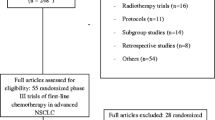Abstract
Background: In Germany, and throughout the world, the lung carcinoma is one of the most common and aggressive forms of cancer. Not only is the diagnosis itself stressful for the patients, but also the disease symptoms, such as (blood) cough, shortness of breath, pain in the chest and shoulders, in addition to the (toxic) side effects of therapies such as fatigue, weight loss, nausea, vomiting or diarrhea. While differences in clinical effectiveness decline, therapeutic alternatives must have a unique selling point. Accordingly, from the perspective of the industry, a stronger focus on patients’ quality of life is the consequence which is also requested by researchers and institutions.
The aim of this study is to investigate whether a change in clinical research is taking place with reference to the inclusion of health related quality of life as an outcome measure in lung cancer trials and, if applicable, what instruments are used for this purpose.
Methods: Using the ClinicalTrials.gov database, we conducted systematic research in late 2010. In particular we examined the quantity of lung cancer trials focusing on health related quality of life as well as on the instruments used. Comparisons were made over time (2005–2010).
Results: “Overall survival” still prevails as the primary endpoint, whereas in clinical trials with biotechnology interventions the measurement of “progression-free survival” was claimed more often as the primary study endpoint. In approximately 10% of the trials “Quality of Life” is indicated as an endpoint. Lung cancer-specific questionnaires like the EORTC LC13, LCSS and FACT-L are most frequently used, sometimes in combination with the generic EQ-5D. Symptom-specific measurements are rare.
Conclusions: A change in clinical research referring to the inclusion of health related quality of life as an outcome measure in lung cancer trials could not be found.
Similar content being viewed by others
Literatur
Robert Koch Institut, Gesellschaft der epidemiologischen Krebsregister in Deutschland e. V. Krebs in Deutschland 2005/2006. Häufigkeiten und Trends. 7. Ausgabe, Berlin, 2010: 48
Ullmann U. Lebensqualität nach Diagnose Lungenkrebs. Edition Wissenschaft: Reihe Psychologie 73. Jg., Marburg: Tectum-Verlag, 2001: 21–4
Zabernigg A. Neues in der Behandlung des nicht-kleinzelligen Bronchialkarzinoms im Stadium IIIB (Pleuraerguss) und IV. Wien Med Wochenschr 2007; 157(21–22): 536–9
Liu J, Mittendorf T, von der Schulenburg JM. A structured review and guide through studies on health-related quality of life in kidney cancer, hepatocellular carcinoma, and leukemia. Cancer Invest 2010; 28(3): 312–22
Di Maio M, Gallo C, De Maio E, et al. Methodological aspects of lung cancer clinical trials in the era of targeted agents. Lung Cancer 2010; 67(2): 127–35
Food and Drug Administration (FDA). Guidance for Industry. Patient-Reported Outcome Measures: Use in Medical Product Development to Support Labeling Claims, 2009. Erhältlich unter URL: http://www.fda.gov/downloads/Drugs/GuidanceComplianceRegulatoryInformation/Guidances/UCM193282.pdf [Abgerufen 01.12.11]
Pirker R. Endpoints in Clinical Trials. Lung Cancer 2009; 64 Suppl. 1: 22
Reck M. Quality of Life as an Endpoint of Clinical Trials. Lung Cancer 2009; 64 Suppl. 1: 22–3
Vansteenkiste J. Is there a preferred Endpoint? Lung Cancer 2009; 64 Suppl. 1: 22
Camps C, del Pozo N, Blasco A, et al. Importance of quality of life in patients with non-small-cell lung cancer. Clin Lung Cancer 2009; 10(2): 83–90
Holzner B, Kemmler G, Greil R, et al. The impact of hemoglobin levels on fatigue and quality of life in cancer patients. Ann Oncol 2002; 13(6): 965–73
Okuyama T, Akechi T, Kugaya A, et al. Development and validation of the cancer fatigue scale: A brief, three-dimensional, self-rating scale for assessment of fatigue in cancer patients. J Pain Symptom Manage 2000; 19(1): 5–14
Radbruch L, Sabatowski R, Elsner F, et al. Validation of the German version of the brief fatigue inventory. J Pain Symptom Manage 2003; 25(5): 449–58
Johnston M, Pollard B, Hennessey P. Construct validation of the hospital anxiety and depression scale with clinical populations. J Psychosom Res 2000; 48(6): 579–84
Tanaka K, Akechi T, Okuyama T, et al. Development and validation of the Cancer Dyspnoea Scale: a multidimensional, brief, self-rating scale. Br J Cancer 2000; 82(4): 800–5
Bergman B, Aaronson NK, Ahmedzai S, et al. The EORTC QLQ-LC13: a modular supplement to the EORTC Core Quality of Life Questionnaire (QLQ-C30) for use in lung cancer clinical trials. Eur J Cancer 1994; 30A(5): 635–42
Browning KK, Ferketich AK, Otterson GA, et al. A psychometric analysis of quality of life tools in lung cancer patients who smoke. Lung Cancer 2009 Oct; 66(1): 134–9
Siewert JR, Rothmund M, Schumpelick V. Praxis der Viszeralchirurgie. Onkologische Chirurgie, 3. Aufl. Heidelberg: Springer, 2010: 402
Cella DF, Bonomi AE, Lloyd SR, et al. Reliability and validity of the Functional Assessment of Cancer Therapy-Lung (FACT-L) quality of life instrument. Lung Cancer 1995; 12(3): 199–220
ClinicalTrials.gov. About ClinicalTrials.gov. Erhältlich unter URL: http://clinicaltrials.gov/ct2/info/about [Abgerufen 30.12.10]
McCray AT, Ide NC. Design and implementation of a national clinical trials registry. J Am Med Inform Assoc 2000; 7(3): 313–23
Fallowfield LJ, Harper P. Health-related quality of life in patients undergoing drug therapy for advanced non-small-cell lung cancer. Lung Cancer 2005; 48(3): 365–77
Hollen PJ, Gralla RJ, Kris MG, et al. Measurement of quality of life in patients with lung cancer in multicenter trials of new therapies. Psychometric assessment of the Lung Cancer Symptom Scale. Cancer 1994; 73(8): 2087–98
Glossmann JP, Walshe R, Bernschein A, et al. Ökonomische Aspekte des Bronchialkarzinoms. Der Onkologe 2010; 16(10): 1003–8
Brettschneider C, Lühmann D, Raspe H. Der Stellenwert von Patient-Reported Outcomes (PRO) im Kontext von Health Technology Assessment (HTA). Informative value of Patient-Reported Outcomes (PRO) in Health Technology Assessment (HTA). Schriftenreihe Health Technology Assessment Bd. 109., 1. Aufl. Köln: DIMDI, 2011. Erhältlich unter URL: http://portal.dimdi.de/de/hta/hta_berichte/hta220_bericht_de.pdf [Abgerufen 01.12.11]
Author information
Authors and Affiliations
Corresponding author
Rights and permissions
About this article
Cite this article
Damm, K., Jacob, C., Mittendorf, T. et al. Lebensqualitätsmessung in klinischen Studien beim Lungenkarzinom — Übersicht anhand der Datenbank ClinicalTrials.gov. Pharmacoeconomics-Ger-Res-Articles 10, 3–15 (2012). https://doi.org/10.1007/BF03320774
Published:
Issue Date:
DOI: https://doi.org/10.1007/BF03320774




